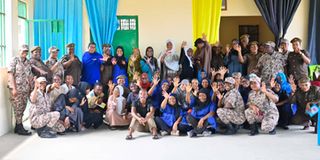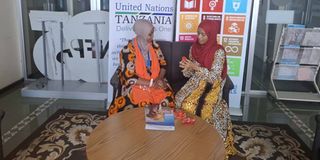MiMa Empowers Zanzibar women with safe and inclusive menstrual health initiative.

Women from the Defence Force (Chuo cha Mafunzo) proudly pose after completing training on safe and sustainable menstrual health practices, conducted by Michezo kwa Maendeleo (MiMa).PHOTO | COURTESY
What you need to know:
- Apart from sportswomen, training was also provided to other groups, totalling 419, according to MIMA’s founder and Executive Director, Fatma Ahmed
Dar es Salaam. In a groundbreaking initiative combining sport and menstrual health education, Michezo Kwa Maendeleo (MIMA, has trained a group of Zanzibar-based sportswomen on safe menstrual practices.
Apart from sportswomen, training was also provided to other groups, totalling 419, according to MIMA’s founder and Executive Director, Fatma Ahmed.
The sportswomen were also equipped with Asan menstrual cups—an innovative, sustainable, and cost-effective solution to the widespread issue of period poverty.
This unique effort targets not only performance improvement among female sportswomen but also the cultural and physical barriers that menstruation poses to their participation in sports.
By offering both education and tools, MIMA is championing dignity, mobility, and health for women who are often forced to sit out during menstruation due to inadequate menstrual hygiene resources.
“Our goal is to ensure no woman or girl has to choose between their health and their career or sport. By equipping sportswomen with Asan menstrual cups and the knowledge to use them safely, we are breaking harmful taboos and opening doors for performance and participation,” said Fatma
Combining Sports and Health: A First in Zanzibar
Partnering with local football clubs such as Warrior Queens and Karafuu Girls, MIMA’s program also reached a significant number of athletes in both urban and rural Zanzibar.
The training focused on safe menstruation practices and debunking myths surrounding menstrual cups. It addressed practical concerns like hygiene, usage, and comfort, particularly in high-intensity environments like sports.
The distribution of Asan cups began with the Warriors Queens Football Team in August 2024, just ahead of their CAF Women’s Champions League CECAFA.
Sportswomen responded positively, citing the benefits of longer wear time, leak-free security, and the absence of odor as game-changers for their confidence on the field.
“Now I can train and compete without worrying about changing pads or missing practice,” said one of the footballers. “The cup has given me freedom.”
A broader impact: From sports to society
While sportswomen were a key focus, MIMA’s impact goes much further. The program reached 419 women overall—including those in defense forces and women living with disabilities—and distributed 350 menstrual cups across the island.
Women in security sectors such as the Jeshi la Kujenga Uchumi (JKU), Kikosi Maalum cha Kuzuia Magendo (KMKM), and ZIMAMOTO na UOKOZI also benefited.
Wearing white uniforms and standing for long hours during parades makes managing menstruation particularly challenging for women officers.
The Asan cup proved not only more discreet and comfortable but also empowering, as it enabled these women to maintain their duties with confidence and dignity.
Women with disabilities, another often-overlooked group, were not left behind. MIMA partnered with local disability organizations to ensure training and support were inclusive.
Though some participants were initially hesitant, the hands-on sessions provided a safe space for learning and adaptation.
Many left not only informed but eager to share their new knowledge with their daughters—pointing to the program’s potential for generational change.

Measurable Social and Environmental Impact
The impact of the program has been tangible. So far a total of 350 women in Zanzibar have now adopted the use of Asan cups, marking a significant shift toward sustainable menstrual health management in the region.
This initiative has empowered women to access a reusable and hygienic alternative to disposable sanitary products, enhancing both comfort and dignity during menstruation.
The impact of this shift is not only environmental but also economic. By switching to Asan cups, households have collectively saved an estimated $71,190 USD in sanitary pad expenses.
This cost-saving is especially meaningful for low-income families, providing financial relief while promoting long-term menstrual hygiene.
In addition, the use of Asan cups has helped reduce environmental pollution. Approximately 8,899 kilograms of menstrual waste, which would have otherwise ended up in landfills, has been successfully diverted.
This contributes to a cleaner environment and supports broader efforts in waste reduction and sustainability across Zanzibar.
Over 88,000 days of increased work or study attendance thanks to improved menstrual management.
This success highlights not just a health intervention, but a social movement. The cost-saving and eco-friendly aspects of the Asan cup—designed at Harvard Innovation Lab and made from medical-grade silicone—have resonated deeply in a region where more than 50 percent of women lack access to safe menstrual care.
Each cup lasts up to 10 years, replacing around 2,500 disposable pads or tampons and significantly reducing long-term costs for users.
Next Steps: Scaling the Impact
Following the strong positive feedback, MIMA is gearing up for phase two of the program, aiming to reach an additional 2,000 women across Zanzibar, especially in underserved rural areas.
Collaboration with key stakeholders such as the Ministry of Health, the Zanzibar National Sports Council, and the UN Population Fund (UNFPA) has laid a strong foundation for broader outreach.
Fatma remains hopeful. “This is only the beginning. The demand is there. The need is urgent. And the potential for change is massive,” she stated.
As the program grows, MIMA and its partners will continue to champion menstrual equity as a fundamental part of women’s health, empowerment, and participation—both on and off the field.




